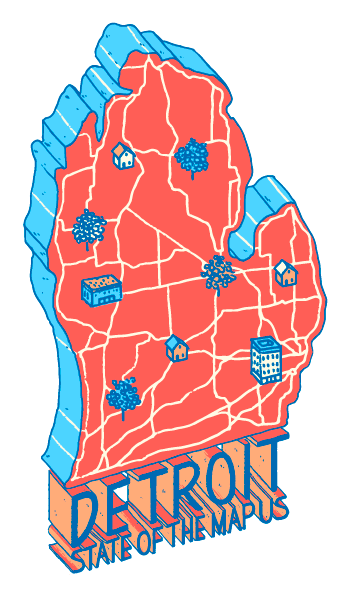Lightning Talks
310A
Saturday, 2:30pm – 1 hour
Saturday, 2:30pm – 1 hour
Jerry Paffendorf, Rebecca Firth, Michelle Steigerwalt, Minh Nguyen, George Hunt, Josh Campbell
When Seeing Isn’t Solving: Data Lessons From Detroit’s Never-Ending Tax Foreclosure Crisis
Jerry Paffendorf, LOVELAND Technologies
What happens when you map a major problem and...nothing much happens? Can map makers and data nerds become change makers?
Loveland Technologies started mapping tax foreclosed properties in Detroit and Wayne County way back in 2010. The assumption was that by seeing the problem, policy makers would do something about it. But since then, approximately 150,000 properties have been tax foreclosed and auctioned, including 50,000 occupied homes.
Over time Loveland has moved from simply providing information about the problem, to partnering with government to work on the problem, to joining a wider network of passionate advocates when government and local leadership were unwilling to go far enough.
In this lightning talk, Jerry Paffendorf will bring you along on this journey, introducing you to Detroit’s evolving data ecosystem, highlighting some of its key contributors, sharing stories of success and failure, relationships frayed and formed, FOIAs sent, and battles fought. The story is not yet over. Grab a seat, and a helmet.
Visualize Change: Animate your mapping
Rebecca Firth, Humanitarian OpenStreetMap Team (HOT)
In late July 2018 HOT will launch our "Visualize Change" tool which enables mappers, mapathon organizers, mapping project managers and anyone else to create quick and easy visualizations of their progress as GIFs or MP4s! We'll announce the release of the tool several months before SoTM, but this will be an opportunity to demo it to the US audience for the first time, get feedback, and invite volunteer code contributions to improve the tool. http://dev.visualize-change.hotosm.org/
The Planet is Very Large
Michelle Steigerwalt, Mapbox
Since its inception, OpenStreetMap has been tremendously successful in growing its database of the entire world. With that success, however, comes the technical hurdles of working with all that data, commonly known as the Planetfile. This session will provide an overview of the most compact of the Planetfile formats: the OSM ProtocolBuffer Format (OSMPBF). We’ll cover practical techniques for breaking the data into more manageable chunks, go through a real-world Mapbox usage example, and consider how we might make things even easier in the future.
OSM Counts: meaningful metrics for local mapping communities
Minh Nguyen
How do we know if we are succeeding in building a comprehensive map? Several tools track OpenStreetMap’s growth in raw terms, but they lack important context for evaluating the project’s coverage. Based on comparable published statistics, OSM Counts is designed to help regional and local communities gauge their relative strengths and weaknesses, measure progress toward a comprehensive map, and take pride in their accomplishments. In this lightning talk, learn about the rationale and methodology behind OSM Counts and how you can use it to rally your local community around concrete goals.
The American Geographical Society and OSM
Josh Campbell, American Geographical Society
This talk will focus on building links between AGS and OSM using education as a vehicle. AGS has been a strong supporter of TeachOSM, and a lightning talk would signal AGS support for these OSM-based activities. It will include information about mapping with 150 teacher fellows, spread across 40 states, and how to engage teachers/community mappers with the aim of connecting the two worlds.
Also, [this](https://americangeo.org/initiatives/ags-geography-teacher-fellows/ags-teachosm-great-county-mapping-contest/) is happening.
Small footprint vector maps for "Internet In a Box"
George Hunt
I have been working with "internet in a box" volunteers for about 5 years. We recently used openlayers, and openmaptiles.com to reduce by a factor of 10 the size of our offline mapping capability.
We'd like to share our success in bringing together the work of many open source mapping developers into an application that runs on a $70 raspberry pi - and still leaves room for khan academy, and wikipedia in the local language.















